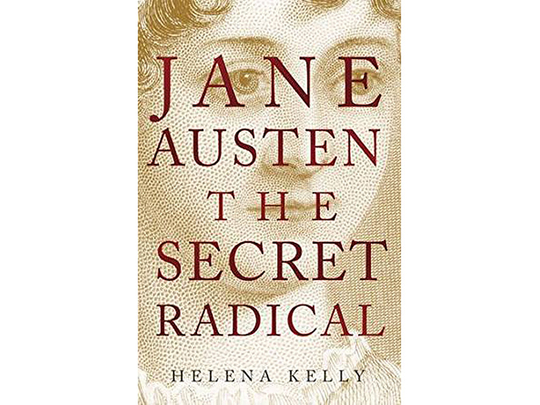
Have we been getting Jane Austen wrong for all these years? Helena Kelly thinks so. She sets out to show us how Austen’s novels have been “so thoroughly, so almost universally, misunderstood”.
They have been accepted as safe, escapist, conservative. To many they have apparently offered “a blissful, almost drugged-up break from reality”. But Kelly will pierce the “haze of preconceptions” obscuring Austen’s fiction. She will show us that, far from giving us “demure dramas in drawing rooms”, Austen used her novels to “examine the great issues of her day”. She will teach us to “read Jane’s novels ... as she intended”.
Her confidence that she has a special knowledge of these intentions is signalled in the opening section of each of her chapters, where she provides novelistic episodes in which “Jane” (always called so in this book) ponders the lowly status of women or the effects of rural poverty or the evils of slavery.
These lead us into chapter-by-chapter treatment of each of the novels, revealing the importanceof money in Sense and Sensibility, or the activities of the militia in Pride and Prejudice, or the possible effect ofenclosures in Emma.
Kelly’s Austen is a “radical” who resents aristocracy, despises the corruption of the Church of England and assails Burkean conservatism. Anyone interested in Austen will begin to see some problems. It seems improbable that, however clear-sighted an interpreter she is, Kelly is the first to see what the great novelist was really up to. And indeed, despite the strident claims of the book jacket, Austen’s engagement with the social issues of her day is not exactly news.
Kelly may be right, for instance, that the world of Persuasion, Austen’s last completed novel, is one in which old social structures seem to be collapsing and the landed gentry are shown as vain and enervated. Yet every self-respecting introduction to every paperback edition of the novel has always pointed this out.
Kelly does not seem to have read any of the many Austen scholars and critics who would have shown her that some of her discoveries are not quite unprecedented. She might also have had some salutary encounters with those who have a different case to put. Some 30 years ago, in Jane Austen and the War of Ideas, Marilyn Butler placed Austen within the ideological disputes of her day and discovered a novelist who was a conservative and a Christian, sharply opposed to the liberal and “Jacobin” novels of her youth. Butler’s deep scholarship does not make her right, but might have made her case worth disputing. She never appears in Kelly’s candidly brief bibliography.
Kelly is powerfully struck by the political content of Austen’s novels, as if she were the very first to stumble on it. This can give her account a certain brio. She is good on how the grim facts of a small-town economy are intimated in Emma, signalling the relative deprivation of many, from the poor cottagers to whom Emma dispenses charity, to the Gypsies who menace Harriet Smith, to the Bateses, just clinging to gentility.
“In spite of its rich, self-absorbed heroine, Emma is about need.” Except that it is not “in spite of” but “because of”. The relative impoverishment of some in Highbury is just glimpsed at the corners of Emma’s occluded vision.
As elsewhere in the book, however, Kelly’s eagerness to find a politically critical subtext leads her to ignore the narrative logic of the fiction. Few are likely to be convinced that Austen depicts Mr Knightley as a ruthless encloser of common land, “blind” to and “inconsiderate” of the concerns of poorer villagers.
Doesn’t the plot turn on his pained understanding of the exact situation of the relatively impoverished Miss Bates? And can he really be convicted as a “Marie Antoinette” of the home counties because he invites all the main characters to a strawberry-picking party (forced on him by the ghastly Mrs Elton)?
This book’s discoveries can be divertingly unlikely. When Catherine Morland excitedly unfastens a locked cabinet in Northanger Abbey, Kelly finds something more than a delicious parody of gothic convention.
“Let’s not mince words here. With all its folds and cavities, the key, the fingers, the fluttering and trembling, this looks a lot like a thinly veiled description of female masturbation.”
She certainly has the courage of her hunches. She decides that Colonel Brandon in Sense and Sensibility is probably the biological father of the young woman Willoughby has seduced. She bizarrely supposes that, in Emma, Harriet Smith and Jane Fairfax “may well be half-sisters”, using as evidence the fact that Jane’s aunt “Miss Bates twice refers to her mother calling her Hetty, which can be short for Harriet”. Except, of course, that it is Miss Bates who is called “Hetty”, not her mother. And there’s the thing: while Kelly is making her claims about the subtexts that have evaded previous critics, Austen admirers will keep noticing little mistakes about what is going on in the novels. She says that Willoughby is drunk when he turns up at what he fears is Marianne’s deathbed in Sense and Sensibility, but in fact his “Yes, I am very drunk” is entirely sarcastic.
To support her contention that for Anne Elliot in Persuasion, “time not only changes, it destroys, it obliterates”, she quotes from the novel about the long years since Anne last saw Captain Wentworth. “What might not eight years do? Events of every description, changes, alienations, removals - all, all must be compromised in it, and oblivion of the past - how natural, how certain too!”
Yet this is Anne trying to convince herself of something that is not true. It leads only to its own refutation. “Alas! With all her reasonings, she found that, to retentive feelings, eight years may be little more than nothing.” The point is that time has not changed Anne’s feelings.
It is a characteristic error, because Kelly is incurious about Austen’s fictional methods. The brilliance of the passage from which she quotes is that itis filtered through Anne’s consciousness, mingling her shrewdness with her delusory self-mortification.
No novelist had attempted such effects before Austen. Here is her true radicalism: notin her opinions - most of which are unknowable - but in the sheer audacity of her fictional technique.
— Guardian News & Media Ltd.









